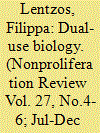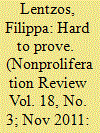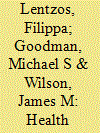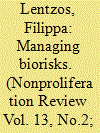| Srl | Item |
| 1 |
ID:
182970


|
|
|
|
|
| Summary/Abstract |
At a time of heightened concern about potential future biological-weapons threats, this article considers how the international community can use the Biological and Toxin Weapons Convention framework to strengthen compliance monitoring of rapidly increasing dual-use capacities around the globe. It presents three conceptual layers within the treaty regime which states can draw from to inform their compliance judgments: one legally binding, one politically binding, and one wholly voluntary. The article outlines how these were established and how they have been used so far, and argues for an incremental, inclusive, practical, and forward-looking approach to evolving these structures to better manage perceptions of the intent behind dual-use capacities, and to further trust between states.
|
|
|
|
|
|
|
|
|
|
|
|
|
|
|
|
| 2 |
ID:
107574


|
|
|
|
|
| Publication |
2011.
|
| Summary/Abstract |
How can compliance with the Biological Weapons Convention (BWC) best be ensured? The verification quandary-the difficulty in providing a high level of assurance that each state party is fully complying with its treaty obligations-has troubled the BWC since its inception in 1972. This article considers past difficulties in negotiating compliance monitoring provisions-such as states' views on inspection procedures-and lays out short-, medium-, and long-term strategies to tackle what has been a very divisive issue. It argues that state parties should undertake conceptual discussions to develop common understandings on the most effective mechanisms to enhance compliance with the treaty, and that it will ultimately be up to state parties to demonstrate the political will necessary to develop measures to strengthen the BWC through effective compliance monitoring and verification measures, either through a new legally binding instrument or through building and augmenting existing provisions.
|
|
|
|
|
|
|
|
|
|
|
|
|
|
|
|
| 3 |
ID:
172074


|
|
|
|
|
| Summary/Abstract |
This article introduces the Special Issue on Global Health Security. It provides an overview of the health security threat spectrum, tracing how perceptions of biological and health security threats have evolved in broad terms over the last century from deliberately introduced disease outbreaks to also incorporate natural disease outbreaks, unintended consequences of research, laboratory accidents, lack of awareness, negligence, and convergence of emerging technologies. This spectrum of threats has led to an expansion of the stakeholders and tools involved in intelligence gathering and threat assessments. The article argues that to strengthen global health security and health intelligence, the traditional state-based intelligence community must actively engage with non-security stakeholders and incorporate space for new sources of intelligence. The aim of the Special Issue is to contribute to the larger effort of developing a multidisciplinary, empirically informed and policy-relevant approach to intelligence-academia engagement in global health security that serves both the intelligence community and scholars from a broad range of disciplines.
|
|
|
|
|
|
|
|
|
|
|
|
|
|
|
|
| 4 |
ID:
075776


|
|
|
|
|
| Publication |
2006.
|
| Summary/Abstract |
The misuse of biological research is increasingly becoming a prominent policy concern. One regulatory measure that has gained considerable support over the last few years in response to this is voluntary self-governance by the scientific community, and in particular codes of conduct. This article charts the rise of the policy debate on codes, highlighting the involvement of the scientific community. Shifting the focus from policy to practice, it explores the effectiveness of codes of conduct as a regulatory measure by examining our experiences of how another voluntary self-governance regime in the biosciences has worked in practice. Noting limitations with voluntary self-governance as a regulatory tool to prevent misuse, this article includes a reflection on the attention paid to codes of conduct in policy discussions, arguing that there are at least three possible interpretations
|
|
|
|
|
|
|
|
|
|
|
|
|
|
|
|